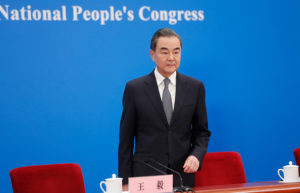Talks between the U.S. Deputy Secretary of State Wendy Sherman and Chinese State Councilor and Foreign Minister Wang Yi picked up in Tianjin, China, on July 26, where the March U.S.-China conference in Anchorage, Alaska, left off. The dynamics of the meetings in Tianjin continued much as they were. China took the stage and the U.S. State Department sat in the mezzanine seats.
As Reuters described the way the talks opened:
“China seized the early narrative, with state media reporting on confrontational remarks by Vice Foreign Minister Xie Feng soon after the session began, in echoes of a similarly combative opening by senior Chinese officials during high-level talks in March in Alaska.”
There is a distinct difference between how the two countries see the discussions. China uses these diplomatic gatherings as opportunities to communicate its messages to those on the geopolitical fences in its neighborhood. To fortify the image of China as a credible global competitor and show the PRC will not be cowed or intimidated by the United States, the U.S. State Department delegation is, for the diplomatic theater, no more than the scenery and props on the negotiating stage.
Consequently, China is not talking earnestly to the U.S. representatives. Instead, the CCP is communicating to Pakistan, India, Malaysia, Indonesia, and developing nations in Africa and South America with forceful language that says, we’re strong and can stand up to the U.S. You can depend on us.
To that end, the tone of the two sides in the talks is very different. According to The New York Times, Ms. Sherman said in a telephone interview, “The relationship between the United States and the PRC is a complex one, and our policy is very complex as a result…We believe our relationship can tolerate the nuance.” On the other hand, the Chinese Communist Party sees the two countries’ association somewhat differently and decidedly less nuanced. As reported in the South China Morning Post:
“China has for the first time given the U.S. a list of red lines and remedial action it must take to repair relations, including lifting sanctions and dropping its extradition request for Huawei financial chief Meng Wanzhou. Chinese Foreign vice-minister Xie Feng told U.S. deputy secretary of state Wendy Sherman on Monday [July 26, 2021] that the U.S.-China relations had reached a ‘stalemate’ and faced ‘serious consequences,’ according to a Chinese foreign ministry statement.”
 Notice it is for the U.S. to take remedial action “to repair relations.” The Biden administration is responsible for making things right between the two nations – not the Chinese. Again, the CCP message plays for its audience, not for any substantive progress in solving problems between the two nations.
Notice it is for the U.S. to take remedial action “to repair relations.” The Biden administration is responsible for making things right between the two nations – not the Chinese. Again, the CCP message plays for its audience, not for any substantive progress in solving problems between the two nations.
For its part, the U.S. has larger geopolitical goals for improved relations. Beijing must stop persecuting the Uighurs in what Ms. Sherman referred to as ” the horrifying actions taking place in Xinjiang, the largely Muslim region in western China where hundreds of thousands have passed through indoctrination camps.” In addition, the U.S. wants China to stop attacks on human rights and freedoms in Hong Kong and cease its belligerent and hostile activities in the South China Sea and threats against Taiwan.
And what are those “red lines” Beijing is worried about? Mostly, they are face-saving. As reported in the South China Morning Post, China’s wish list for the U.S. to capitulate on includes:
“…lifting the visa restrictions on Communist Party members, their families, and Chinese students; lifting the sanctions imposed on Chinese leaders, government officials, and agencies; removing restrictions on Confucius Institutes and Chinese companies; canceling rulings determining Chinese media as foreign agents.”
China also wants the Biden administration to walk back “wrong remarks and actions of the U.S.” regarding exposing the Wuhan laboratory as the origin of the devastating COVID-19 pandemic and CCP policy in the deadly spread of the disease. Again, there is nothing opaque about the intention of the CCP. China wants the U.S. more open again for its spying through the Confucius Institutes and stealing U.S. intellectual property and industrial designs by the loosening of restrictions on Chinese in the U.S. Furthermore, the CCP demands canceling the determination that Chinese media are foreign agents, allowing communist Chinese to maintain the fiction that they are objective journalists reporting in the U.S. and not what they really are; an extension of the PRC propaganda machine.
The Biden foreign policy team should not be faulted for pushing the U.S. agenda for greater rules-based interaction with the Chinese and holding Beijing accountable for its geopolitical transgressions. However, no one should be confused about what China is after with the drama it brings to the diplomatic arena. China wants to be not just an actor on the world stage, but the dominant actor every time the curtain goes up. So far, they may well already be.
The views expressed are those of the author and not of any other affiliation.
~
Read more from Dave Patterson.





